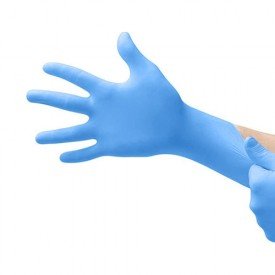Gloves
When dealing with deadly infections and other materials, gloves are essential because they protect our hands from illness and contamination. The type of protective gloves to wear should be determined by the hazards associated.
When your hands are likely to come into touch with infectious pathogens, radioactive materials, or chemicals, wear gloves.
Glove Grades
Gloves are graded based on the task they are being used for. Here you may find information about the different grades of gloves that are ideal for a variety of tasks.
- Food Grade or Food Service Gloves. Food service gloves are made to do a number of activities and aren't meant to be worn for lengthy periods of time. They're safe to use for food preparation and handling, as well as other light-duty, low-risk chores.
- Industrial Grade. These gloves are designed to withstand stronger chemicals and are perfect for a range of cleaning or heavy duty food service activities. They come in a variety of materials, including vinyl, latex, and nitrile.
- Medical/Exam Grade. These gloves are designed for non-surgical operations such as medical examinations and are certified for usage in hospitals, nursing homes, and laboratories. When there's a chance of coming into touch with body fluids or contaminants, they're also used.
Exam gloves must pass strict factory testing and adhere to the FDA's acceptable quality limits (AQL) for exam gloves.
It's vital to remember that certain individuals may have latex sensitivity or allergies, in which case vinyl or nitrile types should be utilised. Due to the possibility of patient sensitivities or reactions to the powder, the FDA prohibited the use of powdered medical/exam gloves on December 19th, 2016. - Surgical Grade. These gloves are generally utilised in medical or healthcare environments and operations when exposure to or contact with bloodborne pathogens is a substantial concern. They are durable and may be utilised in laboratories.
Medical Gloves
Medical gloves prevent cross-contamination between patients and caregivers while also shielding them from potentially harmful substances and microorganisms. It's critical to pick the right gloves and utilise them correctly for optimal protection.


